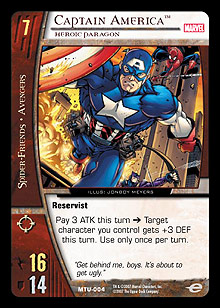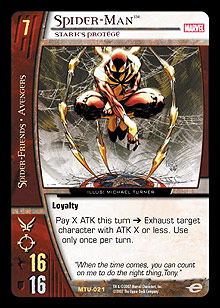Uncle Ben Dead?
I am in an understandably bad mood. Captain America is (probably) dead. I have never really been an avid comic reader—card games are where it’s at—yet my love of comics, the associated characters, and the relevant lore has grown with my affinity for the game. Before I played Vs. System, I did not know about the Crisis or the Squadron Supreme, that Dr. Doom had a daughter, or much else outside of a few favorite characters. These days, I tend to keep some well-educated comic historians in my posse to catch most influential storylines and issues that make their way to the stands in my local game store.
Over the last couple of months, comics have been great and bizarre. Civil War was pretty amazing; Spider-Man earned a smackdown at the hands of Tony Stark. When I first learned about comics, I was taught that super heroes, villains, and just about any other well-developed character in the world of paper and super powers may or may not die. I have the issue where Superman kicked the bucket. I also have a handful of newer books where he is kicking super tail with Batman. Life, death, and more life (and maybe more death) may be in store for our favorite characters, but there was historically one character that died and stayed dead. Captain America’s mid-century sidekick, Bucky, found his tragic end in a plane crash that was thought to have killed Cap. Comic fans used to say that comic characters were “dead” (like Superman and Captain America) or “Bucky-dead” (permanently deceased). While some people made post-mortem comebacks, other characters earned the status of never coming back. There was something comforting in the permanent death of Bucky. I am sure that Bucky’s friends and family did not think it so, but to the casual comic fan, it is difficult to follow your favorite heroes when they do some cool stuff, die, come back from the dead, and do some more cool stuff. I like it when characters who die stay dead. When I mourn for them, the feelings are justified. If you mourn for a character who comes back, you’ve felt bad for no real reason. Comic books should not play with my emotions.
That brings me to one of the great pop-culture ironies of all time: Bucky, of the Bucky-dead fame, is now back alive. A comic aficionado explained to me that Bucky was found in Russia and given some metal parts. He is alive and now metallically kicking! So much for the concept of Bucky-dead. We might as well bring back Uncle Ben and Jason Todd (wait . . .).
 In issue #25 of Captain America, our favorite nationalistic hero meets his apparent second death. At least, he takes a couple of bullets and looks like he is on the way out. Enter my bad mood, because I like Captain America. But if he dies, I feel like he is doomed for rebirth. Therefore, it is tough for me to assign the proper feelings to his death. Do I feel sad? I could cry comic tears, only to find out that he gets some special help from Tony Stark and ends up in his new bionic Captain America suit of gold, but then my sadness would turn to betrayal and anger. If he is, in fact, dead, then I might be sad. But at the same time, I would also be happy that he is “Uncle Ben” dead. As I sit in a pool of swirling emotions, I turn to my comfort, my passion, my proverbial shoulder to cry on: Vs. System.
In issue #25 of Captain America, our favorite nationalistic hero meets his apparent second death. At least, he takes a couple of bullets and looks like he is on the way out. Enter my bad mood, because I like Captain America. But if he dies, I feel like he is doomed for rebirth. Therefore, it is tough for me to assign the proper feelings to his death. Do I feel sad? I could cry comic tears, only to find out that he gets some special help from Tony Stark and ends up in his new bionic Captain America suit of gold, but then my sadness would turn to betrayal and anger. If he is, in fact, dead, then I might be sad. But at the same time, I would also be happy that he is “Uncle Ben” dead. As I sit in a pool of swirling emotions, I turn to my comfort, my passion, my proverbial shoulder to cry on: Vs. System.
The Death of a Hero: Character Advantage
Game design is a dance between mechanics and any number of important trading card game themes. Vs. System is the only viable trading card game that is thematically pure. What do you think would be the most devastating thing that might happen to a comic book character? The answer to that semi-rhetorical question, my readers, is death. The most important aspect of comics is the super heroes and super villains. They drive the stories, provide the combat, and keep us reading.
In the Vs. System card game, the most important thing is the characters on the field. They keep the game going, protect your endurance, and provide the combat. Have you ever won a game with no characters? Seems impossible! Have you ever lost a game by missing a drop? Happens all the time! This game is all about having characters on the board and keeping them there.
To extend this theory, it may also be stated that having the best characters on the board tends to win games. If my opponent and I both field two characters, the player with the best two characters has a distinct advantage. Bigger characters or characters with built-in tricks give a player advantage without the reliance on additional cards like resources, locations, plot twists, or equipment cards. If you drop a character with 5 ATK / 5 DEF and I drop a character with 6 ATK / 6 DEF, then I will win in combat. You would need additional tricks to take me down. While you may have those tricks, I also have tricks and may offset the tricks you played on me. By not having to use my tricks, I might also have more tricks left for later in the game.
Over time, dropping superior characters can add up to board advantage. Board advantage flanks character prowess to make up the most important aspect of Vs. System. If I can take two of my characters into combat with two of your characters and walk away with two when you walk away with only one, then I am likely winning. This may be a bit oversimplified, but generalizations can form the foundations that help you develop into a pro level player.
 The tenets of Vs. System are best taught in Sealed Pack play. Sealed Pack play strips a deck of fancy tricks and stylish synergy, reducing it to the bare-bones rawness of character prowess. Some Sealed decks get some great tricks going, but the best decks play the best character cards. Sealed play makes a player rely on the pure strength of characters and on hitting a curve to win a majority of the games. If you under-drop, miss a drop, or drop inferior characters, you often sacrifice board advantage and overall game advantage to a player who curves out with strong characters.
The tenets of Vs. System are best taught in Sealed Pack play. Sealed Pack play strips a deck of fancy tricks and stylish synergy, reducing it to the bare-bones rawness of character prowess. Some Sealed decks get some great tricks going, but the best decks play the best character cards. Sealed play makes a player rely on the pure strength of characters and on hitting a curve to win a majority of the games. If you under-drop, miss a drop, or drop inferior characters, you often sacrifice board advantage and overall game advantage to a player who curves out with strong characters.
I have been playing this game for about four years, and I made my most significant growth as a player when I understood the importance of characters on the field and examined the principle of board advantage. Board advantage allows you to team attack. You can send smaller characters into a large character for the stun and send your largest character into the opponent’s smallest character for breakthrough (in a 3:2 situation). If you are outsized, you might then be able to send your largest character and smallest character into a big opposing character, saving your mid-sized character for the last attack. In either case, you might keep two characters to your opponent’s one character.
I once heard a research and design guru (Danny Mandel) talking about the importance of characters in Vs. System. He said something to the effect that you might spend all of the cards in your hand to keep a key character on the board. It is rare to find a game with this much emphasis on characters and board advantage. Many trading card games rely on card advantage. In Vs. System, though, you may have noted the absence of removal cards. There are no cards that destroy character cards outright and few playable cards that clear the entire field. While I realize that there are some specific possible exceptions, there is not a prominent type of removal in Vs. System. Further, you get to draw a couple cards each turn. Some games limit your card draw, which limits the chance of hitting the type of curve required in Vs. System. Because the character curve and exhaustive use of your resource points are essential, drawing two cards (or more) seems appropriate.
Characters also play an important part in preventing endurance loss. They shield direct damage by blocking some of that damage. In Vs. System, we have breakthrough, which is essentially the spillover of what your characters couldn’t absorb. The more characters you have, the more damage can be sponged. Unless you are playing hidden characters, your characters also prevent some nasty effects that only trigger when you attack a player directly.
Additional damage is prevented through the use of reinforcement. If you have extra characters on the board, then those characters may prevent the breakthrough from big attackers. In many cases, if you can keep board advantage and control the loss of your endurance, you will own the tempo of the game.
If you are struggling with a certain pet deck, you may want to think about the key benefits and importance of board advantage. I fix problems with many of my decks by either adding additional characters and providing defense for them, or including ways to ensure that I get specific, high quality characters. Search cards have always been the most important and collectable cards in the game. They are only this important because of the inherent importance of getting your characters onto the field and into combat. If you can generate a higher number of great combatants than your opponent, then your super heroes will likely win.
Kingpin’s Crib Notes:
Factors Contributing to the Importance of Character Presence
1. Lack of removal in Vs. System
2. Card drawing / search mechanics
3. Endurance / breakthrough mechanics
4. Team attacks / reinforcement
Class dismissed.
Jeremy “Kingpin” Blair (7-drop, TAWC) is a card flipper and student of the game from the southeastern part of the United States. The Kingpin has started an Internet campaign for the permanent death of all comic characters. Join the fight to keep the Captain dead. Thanks for all the recent comments and mail. Look forward to seeing the answers to your questions in an upcoming lesson.